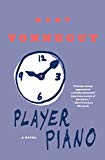
Player Piano is a dystopian novel that tells the story of Dr. Paul Proteus, manager of the Ilium Works. The world of the novel is highly mechanized; consequently, society has become sharply divided into engineers, who invent and maintain the machines, and everyone else. Unemployment is high because machines do everything, even if people don't want them to. When Dr. Proteus is caught up in a rebel movement to overthrow the machines, he discovers the inevitability of progress. This novel examines themes of powerlessness, dignity, and modern society.
The automation of industry and the effect this has on society is predominant theme of Player Piano . It is "a novel about people and machines, and machines frequently got the best of it, as machines will." More specifically, it delves into a theme Vonnegut returns to, "a problem whose queasy horrors will eventually be made world-wide by the sophistication of machines. The problem is this: How to love people who have no use." Unlike much dystopian fiction, Player Piano 's society was created by indifference, both of the populace and the technology that replaced it. As such, it is the sense of purposelessness of those living in a capitalistic society that has outgrown a need for them which must be rectified.
Mankind's blind faith in technology (and its usually disastrous effect on society) as well as the dehumanization of the poor or oppressed have since become common themes throughout Vonnegut's work. Throughout his life, Vonnegut continued to believe the novel's themes were of relevance to society, writing for example in 1983 that the novel was becoming "more timely with each passing day".
Already have an account? Log In Now